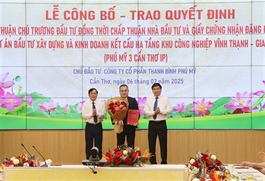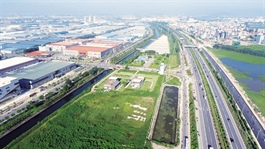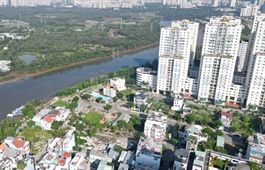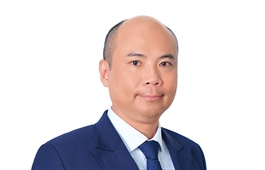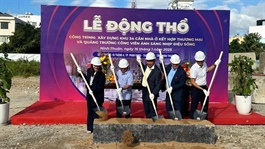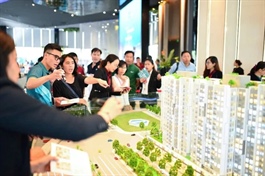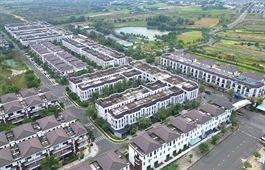Clarifying rules on foreign property ownership
Clarifying rules on foreign property ownership
Updates to housing laws are bringing positive changes to overseas Vietnamese, foreign individuals and foreign institutions.
A new set of key laws regulating the Vietnam real estate market, namely the Land Law, the Law on Real Estate Business and the Law on Housing, came into effect on August 1, 2024.
The recent updates to Vietnam's real estate laws aim to enhance transparency, encourage investment, and protect the rights of property owners and investors.
These new laws are making positive changes to house-ownership rights for overseas Vietnamese, foreigners and foreign organisations. Significantly, foreigners’ right to buy and sell housing from fellow non-nationals is recognised in the new legislation. Furthermore, overseas Vietnamese are now permitted to buy and rent houses that come with land, obtain land-use rights at housing projects and inherit residential and other types of land adjoining houses.
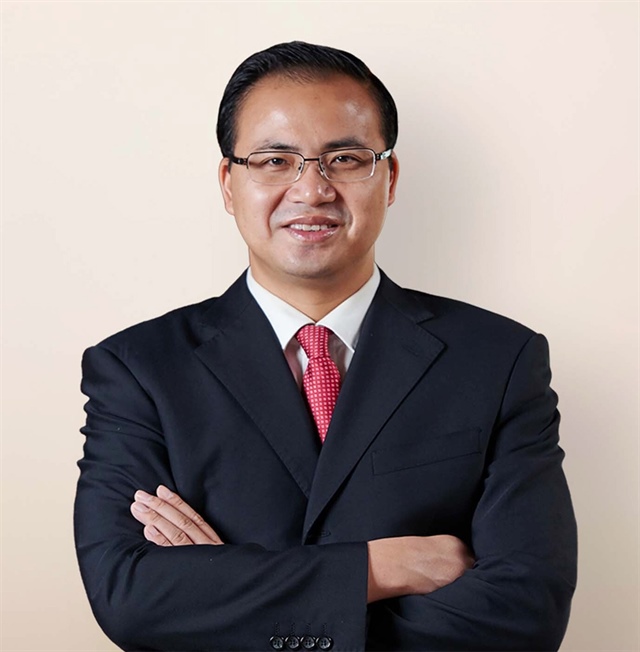
Vu Le Bang, partner of Nishimura & Asahi |
Under the Law on Housing, “housing” is a construction work intended for living that meets the needs of a family or individual, which includes single-family house, apartment buildings, commercial housing, official residences, relocation housing, social housing. Accordingly, overseas Vietnamese, foreigners and foreign organisations could be eligible for ownership of one or more types of such housing, subject to meeting respective statutory conditions.
Compared with the previous Law on Housing, the new one explicitly provides that the eligible overseas Vietnamese for owning housing in Vietnam are the overseas Vietnamese in accordance with the law on nationality.
Under the Law on Vietnamese Nationality, overseas Vietnamese are Vietnamese citizens and persons of Vietnamese origin who permanently reside abroad. In which, “persons of Vietnamese origin residing abroad” are Vietnamese people who used to have Vietnamese nationality which had been determined at the time of their birth on the consanguinity principle and their offsprings and grandchildren are permanently residing in foreign countries.
The Law on Housing also stipulates that overseas Vietnamese must satisfy certain conditions to own housing in Vietnam. Specifically, an overseas Vietnamese may own houses associated with residential land use right in accordance with Land Law if such overseas Vietnam is permitted to enter Vietnam.
The supporting documents are a valid Vietnamese passport bearing Vietnam entry stamp at the time of housing establishment regarding overseas Vietnamese being Vietnamese citizens, a valid foreign passport/international travel document bearing a Vietnam entry stamp at the time of signing housing transaction regarding a person of Vietnamese origin.
Foreign organisations and individuals
There is no explicit definition of “foreign individual” under the Law on Housing. However, a similar term has been defined under the Law on Entry, Exit, Transit, and Residence of Foreigners in Vietnam, in which, “foreigners” mean those who have papers proving their foreign nationalities, or those without nationalities, enter, exit, transit through, or reside in Vietnam.
The Law on Housing stipulates that the foreign individuals who are permitted to enter Vietnam (with foreign passport bearing Vietnam entry stamp) and not subject to diplomatic or consular privileges and immunities as prescribed by laws (with the written commitment) are entitled to own the commercial residential housing in Vietnam.
Different from foreign individuals, the Law on Housing provides specific categories of foreign organisations. Accordingly, the foreign organisations that are entitled to own the residential housing in Vietnam include foreign-invested economic organisations building houses in projects in Vietnam in accordance with Law on Housing and relevant regulations and foreign-invested economic organisations, branches, representative offices of foreign enterprises, foreign investment funds, and branches of foreign banks operating in Vietnam.
Overseas Vietnamese
In principle, overseas Vietnamese are entitled to own housing associated with residential land use right in accordance with the Land Law. Under this law, the overseas Vietnamese are recognised as land users. However, a significant amendment under the new Land Law is that the overseas Vietnamese being Vietnamese citizens and persons of Vietnamese origin are classified into two separate groups of land users.
Specifically, overseas Vietnamese being Vietnamese citizens are in the same group with domestic individuals, which means that they can enjoy full rights related to land, not only those to residential land, like Vietnamese citizens inside Vietnam. Furthermore, they are now fully entitled to acquire land use rights (LURs) of the residential land outside the housing development project to build and own houses like Vietnamese citizens inside Vietnam.
Meanwhile, the persons of Vietnamese origin are in a separate group and have fewer rights related to land than those of overseas Vietnamese being Vietnamese citizen. In detail, they can purchase, lease-purchase housing attached to the residential LURs; receive residential LURs in housing development projects; inherit LURs of residential land and other categories of land in the same parcel with housing; receive housing attached to residential LURs gifted by lawful heirs.
With respects to rights associated with the housing, overseas Vietnamese are entitled to, among other rights, be granted with the certificate on land use rights, ownership rights of residential housing and other assets attached to land for the housing under their lawful ownership; sell, lease-purchase, gift, exchange, bequeath, mortgage, contribute capital using housing; transfer housing sale and purchase contract; and rent, lend, allow temporary residence, delegate housing management, and other rights as prescribed by law.
Unlike the overseas Vietnamese, the foreign organisations and individuals are only entitled to own single-family houses and apartment in housing development projects, except for projects in areas requiring national defence and security assurance in accordance with Vietnamese laws, which must be notified by the Ministry of National Defence and the Ministry of Public Security and determined and published by local people’s committees.
The foreign organisations and individuals basically have rights associated with housing, the same as those of overseas Vietnamese. However, there are statutory restrictions on their rights. For instance, in the case of the foreign-invested housing developers on leased land, such an organisation is only entitled to lease the residential housing.
There is also a cap on foreign housing ownership quota applicable to foreign individuals and organisations rather than the foreign-invested housing developers, namely 30 per cent of all apartment units in an apartment building, and 250 houses on an area with a population size equivalent to a ward in case of separate houses (including villas, terraced housing). Foreign individuals and organisations rather than the foreign-invested housing developers are only eligible to the value of the housing in the case of being gifted or inheriting houses, which are not commercial housing or exceeding the foreign ownership quota or located in the areas requiring national defence and security.
The housing ownership term of foreign individuals and organisations rather than the foreign-invested housing developers is subject to their agreement in housing transactions. However, with respect to the foreign organisation rather than the foreign-invested housing developers, the housing ownership term must not exceed the term of their investment certificates (including the extended period).
Meanwhile, the housing ownership term of foreign individuals not exceeding 50 years from the issuance date of the certificate and may be extended once for a term not exceeding 50 years if there is demand. Specially, when foreign individuals are married to a Vietnamese citizen or overseas Vietnamese, they are eligible to own housing and have the same rights of housing owners as Vietnamese citizens or overseas Vietnamese.
Housing transactions consist of sale, purchase, lease purchase, rent, gifting, swap, inheritance, mortgage, capital contribution, lending, lodging, authorisation for housing management.
Housing in transactions must satisfy the following requirements: having a certificate relating land use rights and housing, except for statutory cases, such as, purchase, lease purchase, mortgage of off-plan housing; housing sale in the case of dissolution, bankruptcy; lease, lending, lodging, and authorisation for housing management; house inheritance; not subject to disputes, complaints, lawsuits regarding ownership as per the law (not applicable to off-plan housing); house ownership tenure is not expired (not applicable to off-plan housing); not designated for the enforcement of judgments or compliance with legally binding administrative decisions from the appropriate authority, nor subject to temporary emergency or preventive measures as dictated by the court or relevant authority; not subject to decisions on land expropriation, notice on clearance, demolition of competent authority.
In principle, parties to housing transactions must satisfy requirements regarding subjects of transaction in accordance with civil laws. Specifically, the parties have civil legal capacity and capacity for civil acts appropriate to the established civil transaction, and voluntarily participate in the transaction. Overseas Vietnamese, foreigners, and foreign organisation, as a party to housing transactions, are eligible for housing ownership in Vietnam as regulated under the Law on Housing.
Execution of housing contracts: Parties to housing transactions must produce contracts for purchase, lease purchase, lease, gift, swap, mortgage, capital contribution, lending, lodging, housing management authorisation containing statutory details.
Notarisation or certification of housing contracts: Notarisation of housing contracts must be implemented by notarising organisations; certification of housing contracts will be implemented by commune people’s committees where the houses are located. Notarisation can be done by legal requirements or parties’ option. Mandatory cases include housing purchase, lease purchase, gifting, swap, capital contribution, mortgage, inheritance. The housing contracts will be effective from the date on which notarisation or certification is done. Meanwhile, optional cases (subject to parties’ demand) comprise gifting of charity houses; purchase, lease purchase of state-owned housing; purchase, lease purchase of houses where either party is an organisation, such as social housing, housing for people’s armed forces, relocation housing; capital contribution in form of houses where either party is an organisation; lease, lodging, authorisation for housing management. In such case, the housing contracts will be effective from the date as agreed by parties or the signing date of the contract.
Issuance of a certificate: Subject to parties’ agreement, either party submits a request for the certificate regarding housing ownership to competent authorities. In the case of purchase and lease-purchase of houses of developers, project developers are responsible for obtaining the certificate for buyers, unless buyers voluntarily do such procedure. In practice, the certificates are successfully issued to the foreign organisations and individuals in Hanoi.
Vietnamese laws require an organisation and individual to pay income tax in the case of incurring the income in Vietnam such as the income from the transfer of the real estate, except for certain statutory cases (e.g., transfer of real estate between the husband and wife). The individuals and organisations must pay income tax in the case of selling residential housing in Vietnam with the tax rate of 2 per cent and 20 per cent, respectively. The receipt of residential housing as a gift or inheriting the residential housing by the individual also arise the tax by laws, except for certain statutory cases (e.g., between the husband and wife).
Notably, in the case of buying residential property in Vietnam, the homebuyer is required to pay the registration fee before registration of ownership rights with the state authority at the rate 0.5 per cent, and based on the unit price issued by the local people’s committee or the sale price under the transfer agreement, whichever is higher.
According to the Ministry of Construction, from 2015 to the end of the third quarter of 2023, more than 3,000 foreigners bought houses in Vietnam, mainly apartments in commercial housing projects in large cities and provinces. Of which, Hanoi accounted for more than half with 1,765 units; Ho Chi Minh City, and Bac Ninh, Binh Duong and Ba Ria-Vung Tau provinces accounted for 1,000 units, 110 units, 210 units, and 50 units respectively.
In the first half of 2024, foreigners bought more than 1,000 apartments in Hanoi. In the last quarter of 2024, Hanoi Department of Construction allowed seven more apartment projects, with about 3,000 apartments sold to foreigners, which are mostly high-end apartment projects in urban areas.
Such projects are also quickly sold, and more than 60 per cent of the apartments allowed for sale to foreigners. As reported by Hanoi Department of Construction, there are 67 certificates for housing ownership granted to foreign organisations and foreigners owning units in apartments building in Hanoi counting till December 16, 2022.







